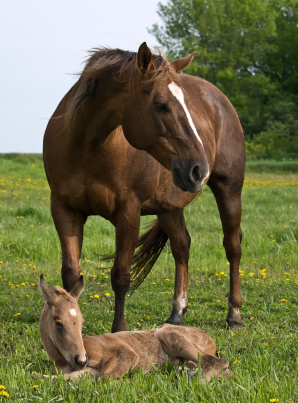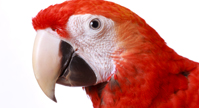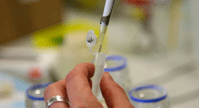Polysaccharide Storage Myopathy (PSSM)
Description:
 Polysaccharide Storage Myopathy (PSSM1) is a dominant autosomal hereditary condition that can cause a genetic form of tying-up with muscle damage and inability to move. One form of PSSM1 is in part a result of a single base pair substitution in GYS1 gene, thereby changing the amino acid sequence of the glycogen synthase enzyme. At least 20 breeds have been identified with Type 1 PSSM. The prevalence of the GYS1 mutation in Belgians is as much as 50% of and 8% of the Quarter Horse-related breeds.
Polysaccharide Storage Myopathy (PSSM1) is a dominant autosomal hereditary condition that can cause a genetic form of tying-up with muscle damage and inability to move. One form of PSSM1 is in part a result of a single base pair substitution in GYS1 gene, thereby changing the amino acid sequence of the glycogen synthase enzyme. At least 20 breeds have been identified with Type 1 PSSM. The prevalence of the GYS1 mutation in Belgians is as much as 50% of and 8% of the Quarter Horse-related breeds.
Some horses make and store abnormal muscle glycogen and cannot tolerate dietary starches and sugars. Horses with PSSM1 can be maintained with low-starch and low-sugar rations and precise exercise protocols. In some horses symptoms may begin by 2 to 3 years of age while others can remain subclinical. Clinical signs can include skin twitching, stiffness, firm painful muscles, sweating, weakness, and reluctance to move with light exercise. Occasionally gait abnormalities, mild colic and muscle wasting may also occur. In may cases horse that have tested positive have had no history of 'tying-up' or other symptoms associated with PSSM1.
Research conducted at Animal Genetics has identified several additional mutations associated with PSSM1. These DNA mutations form a haplotype that allow us to identify horses with PSSM1. Further ongoing research may provide us with a more comprehensive assay for PSSM and better determine the severity of the disorder in all horses.
An additional genetic mutation in RYR1 gene (MH) influences PSSM and increase the severity of the symptoms of PSSM1 in Quarter Horses and related breeds. The combination of PSSM and MH genetic tests are available at Animal Genetics.
Not all cases of tying up are caused by the PSSM1 mutations currently being looked at. A horse that tests N/N for PSSM1 but exhibits signs of tying-up or muscle pain may be suffering from an another muscle disorder. Please contact us with any examples of this so we can include these animals in further studies. In many cases horses that test positive for these mutations will exhibit only minor problems or may never exhibit any noticeable problems at all. Again, please contact us and let us know so we can add these animals to our current research on PSSM1.
Management of Horses That Test Positive For PSSM1:
Horses that test positive for 1 or 2 copies of the GYS1 mutation should be carefully managed through diet and exercise to help prevent the onset of the disease. For many horses affected by PSSM1, strict control of diet and exercise can reduce, or even prevent the onset of symptoms related to PSSM1. Eliminating many high sugary foods in their diet and consistent exercise are two simple ways to help prevent the disease from developing. Although taking these simple steps may not be effective in every situation, research has shown that often they will provide positive results. It is always important to let your veterinarian know if an animal has tested positive for PSSM1.
Breeds Affected:
Animal Genetics offers DNA testing and detection for markers identifying horses that could suffer from PSSM in American Paint horses, Appaloosas, Draft Breeds, Quarter horses (horse with quarter horse blood) and Warmbloods. Animal Genetics is working on identifying the genetic link in other breeds of horses. Please contact us if you have any horses that may be suffering from the disorder.
Additional Tests For Horses:
Hyperkalemic Periodic Paralysis Disease (HYPP)
Hereditary Equine Regional Dermal Asthenia (HERDA)
Glycogen Branching Enzyme Deficiency (GBED)
Combination 5 panel (PSSM, MH, HYPP, HERDA, GBED) $95.00
Test Results:
Animal Genetics offers DNA testing for Polysaccharide Storage Myopathy (PSSM). The genetic test verifies the presence of the dominant PSSM mutation and presents results as one of the following:
| P1/P1 | Affected | Positive for the dominant PSSM gene mutations, indicates the animal carries two inherited copies. Homozygous PSSM horses are genetically bound to pass the gene to 100% of their progeny when bred meaning all foals will be have at least one copy of the dominant PSSM gene mutation. |
| n/P1 | Affected | Both the normal and PSSM alleles were detected. Horse tested heterozygous for PSSM. The horse is affected with the PSSM genetic disorder and there is a 50% chance that this horse will pass a PSSM allele to its offspring. |
| n/n | Clear | Horse tested negative for PSSM and does not carry the PSSM gene mutations. The horse will not pass on the defective mutations to its offspring. |
Submit a Sample for Testing:
To submit a sample for testing please click on ORDER and download a sample submission form. Then follow the sample collection and submission instructions.
Cost per sample is $40.00. Please see our Equine Fee Schedule for all equine testing rates.
References:
Neuromuscul Disord. 2009 Jan;19(1):37-43. doi: 10.1016/j.nmd.2008.10.001. Epub 2008 Dec 3. Polysaccharide storage myopathy phenotype in quarter horse-related breeds is modified by the presence of an RYR1 mutation. McCue ME1, Valberg SJ, Jackson M, Borgia L, Lucio M, Mickelson JR.
Vet Rec. 2010 Nov 13;167(20):781-4. doi: 10.1136/vr.c3447. Presence of the glycogen synthase 1 (GYS1) mutation causing type 1 polysaccharide storage myopathy in continental European draught horse breeds. Baird JD1, Valberg SJ, Anderson SM, McCue ME, Mickelson JR.
Anim Physiol Anim Nutr (Berl). 2011 Dec;95(6):798-807. doi: 10.1111/j.1439-0396.2010.01116.x. Epub 2010 Dec 28. Glycaemic and insulinaemic responses to feeding hay with different non-structural carbohydrate content in control and polysaccharide storage myopathy-affected horses. Borgia L1, Valberg S, McCue M, Watts K, Pagan J.










